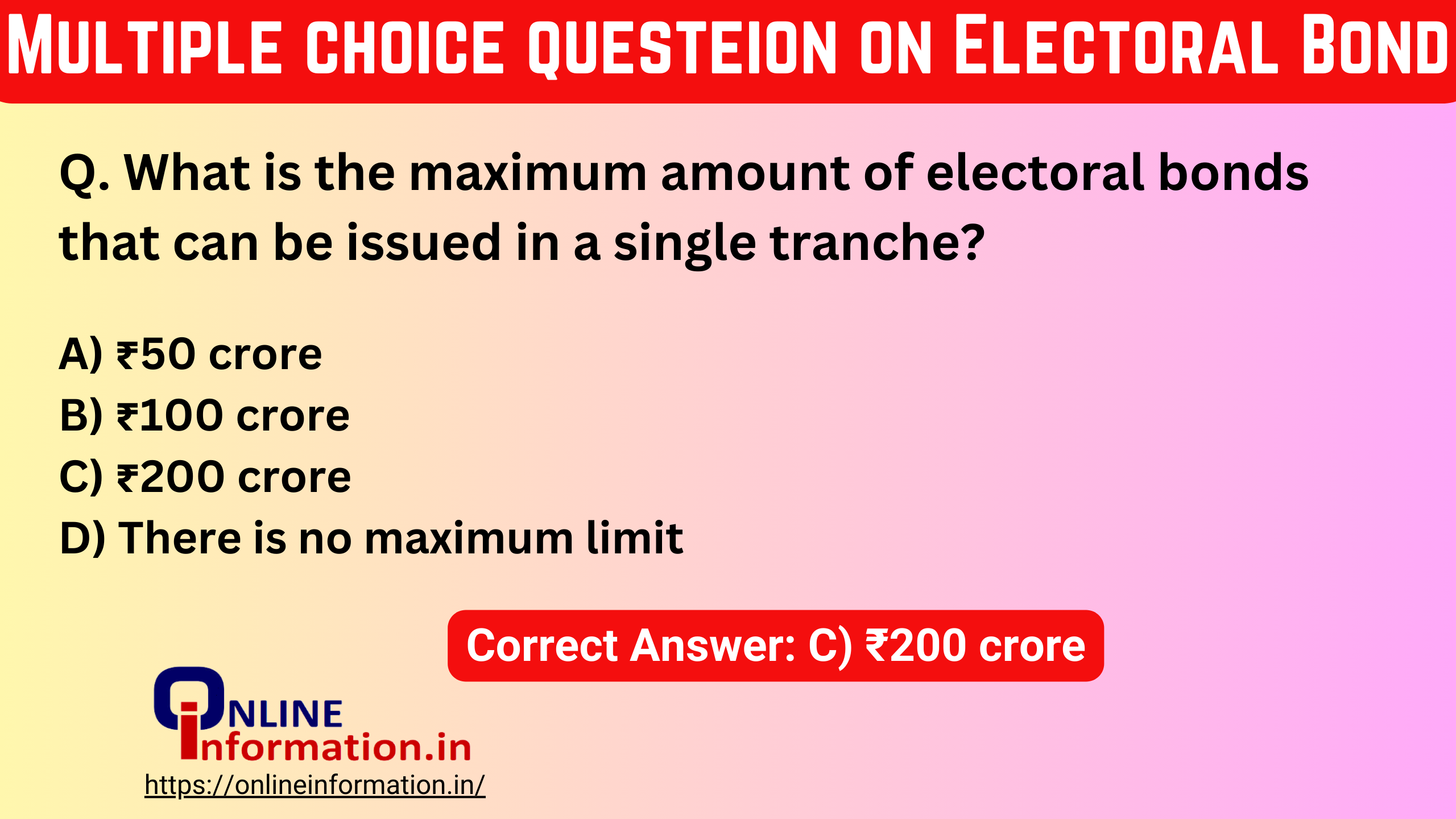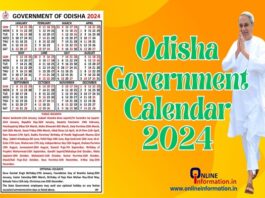Contents
- 1 Merits of electoral bonds
- 1.0.0.0.1 What are electoral bonds?
- 1.0.0.0.2 A) Bonds issued by political parties
- 1.0.0.0.3 Electoral bonds were introduced in which year in India?
- 1.0.0.0.4 A) 2015
- 1.0.0.0.5 Who can purchase electoral bonds?
- 1.0.0.0.6 A) Individuals
- 1.0.0.0.7 Electoral bonds are available in what denominations?
- 1.0.0.0.8 A) ₹1,000, ₹10,000, ₹1,00,000, ₹10,00,000
- 1.0.0.0.9 Which organization issues and facilitates the sale of electoral bonds?
- 1.0.0.0.10 A) Reserve Bank of India
- 1.0.0.0.11 Electoral bonds have a validity period of how many days from the date of issue?
- 1.0.0.0.12 A) 60 days
- 1.0.0.0.13 Electoral bonds can be encashed by which entity?
- 1.0.0.0.14 A) Political parties registered under section 29A of the Representation of the People Act, 1951
- 1.0.0.0.15 The identity of the donor purchasing electoral bonds is kept confidential from which entity?
- 1.0.0.0.16 A) Election Commission
- 1.0.0.0.17 Electoral bonds can be encashed only through which mode?
- 1.0.0.0.18 A) Cash
- 1.0.0.0.19 What is the maximum limit for donations through electoral bonds that a company can make in a financial year?
- 1.0.0.0.20 A) 5% of the average net profits made during the three immediately preceding financial years
- 1.0.0.0.21 Electoral bonds were introduced with the aim to promote which of the following?
- 1.0.0.0.22 A) Transparency in political funding
- 1.0.0.0.23 Electoral bonds are available for purchase at designated branches of the State Bank of India only during which months?
- 1.0.0.0.24 A) January, April, July, October
- 1.0.0.0.25 What is the maximum validity period for an electoral bond after its issuance?
- 1.0.0.0.26 A) 60 days
- 1.0.0.0.27 Which of the following is true regarding the disclosure of the identity of donors purchasing electoral bonds?
- 1.0.0.0.28 A) It is publicly disclosed by the Election Commission.
- 1.0.0.0.29 What is the minimum denomination of electoral bonds available?
- 1.0.0.0.30 A) ₹1,000
- 1.0.0.0.31 Which section of the Representation of the People Act, 1951, regulates the registration of political parties eligible to receive electoral bonds?
- 1.0.0.0.32 A) Section 20A
- 1.0.0.0.33 Which of the following is not a valid mode of payment for the purchase of electoral bonds?
- 1.0.0.0.34 A) Cash
- 1.0.0.0.35 Electoral bonds are available for purchase by which type of entities?
- 1.0.0.0.36 A) Individuals
- 1.0.0.0.37 What is the maximum limit for cash donations to political parties under the Income Tax Act, 1961, after the introduction of electoral bonds?
- 1.0.0.0.38 A) ₹2,000
- 1.0.0.0.39 Which of the following organizations is responsible for administering the Electoral Bonds Scheme?
- 1.0.0.0.40 A) Election Commission of India
Electoral bonds are financial instruments that were introduced in India in 2018 as a way for individuals, companies, and other entities to make anonymous donations to political parties. These bonds can be purchased in specified denominations from selected banks and then given to a registered political party. The intent is to increase transparency and accountability in political funding.
Merits of electoral bonds
Merits of electoral bonds include increased transparency in political funding and the anonymity they provide to donors. However, a major demerit is that critics argue they can still potentially influence political decisions and create opportunities for corruption.
MCQs (Multiple Choice Questions) are an important part of many competitive exams in India, such as Banking, SSC, Railway, UPSC, and State PSC exams (OSSC, OSSSC, OPSC…). These exams assess the candidates’ knowledge and skills in the field of cuttent affair
Also Read:The Longest Rivers in India
-
What are electoral bonds?
A) Bonds issued by political parties
B) Bonds issued by the government for funding political parties
C) Bonds issued by the Election Commission
D) Bonds issued by international organizations
Answer: B) Bonds issued by the government for funding political parties -
Electoral bonds were introduced in which year in India?
A) 2015
B) 2016
C) 2017
D) 2018
Answer: C) 2017 -
Who can purchase electoral bonds?
A) Individuals
B) Companies
C) Trusts
D) All of the above
Answer: D) All of the above -
Electoral bonds are available in what denominations?
A) ₹1,000, ₹10,000, ₹1,00,000, ₹10,00,000
B) ₹1,000, ₹10,000, ₹1,00,000, ₹1,00,00,000
C) ₹1,000, ₹10,000, ₹1,00,000, ₹1,00,000,000
D) ₹10,000, ₹1,00,000, ₹10,00,000, ₹1,00,00,000
Answer: A) ₹1,000, ₹10,000, ₹1,00,000, ₹10,00,000 -
Which organization issues and facilitates the sale of electoral bonds?
A) Reserve Bank of India
B) Election Commission of India
C) State Bank of India
D) Ministry of Finance
Answer: C) State Bank of India -
Electoral bonds have a validity period of how many days from the date of issue?
A) 60 days
B) 90 days
C) 120 days
D) 180 days
Answer: C) 120 days -
Electoral bonds can be encashed by which entity?
A) Political parties registered under section 29A of the Representation of the People Act, 1951
B) Individuals
C) Corporations
D) NGOs
Answer: A) Political parties registered under section 29A of the Representation of the People Act, 1951 -
The identity of the donor purchasing electoral bonds is kept confidential from which entity?
A) Election Commission
B) Reserve Bank of India
C) Political parties
D) Media
Answer: C) Political parties -
Electoral bonds can be encashed only through which mode?
A) Cash
B) Cheque
C) Digital transfer
D) Demand draft
Answer: C) Digital transfer -
What is the maximum limit for donations through electoral bonds that a company can make in a financial year?
A) 5% of the average net profits made during the three immediately preceding financial years
B) 7.5% of the average net profits made during the three immediately preceding financial years
C) 10% of the average net profits made during the three immediately preceding financial years
D) 15% of the average net profits made during the three immediately preceding financial years
Answer: C) 10% of the average net profits made during the three immediately preceding financial years -
Electoral bonds were introduced with the aim to promote which of the following?
A) Transparency in political funding
B) Anonymity in political funding
C) Corporate control over political decisions
D) State control over political parties
Answer: A) Transparency in political funding -
Electoral bonds are available for purchase at designated branches of the State Bank of India only during which months?
A) January, April, July, October
B) February, May, August, November
C) March, June, September, December
D) May, June, November, December
Answer: C) March, June, September, December -
What is the maximum validity period for an electoral bond after its issuance?
A) 60 days
B) 90 days
C) 120 days
D) 180 days
Answer: C) 120 days -
Which of the following is true regarding the disclosure of the identity of donors purchasing electoral bonds?
A) It is publicly disclosed by the Election Commission.
B) It is disclosed to the Reserve Bank of India.
C) It is kept confidential from political parties.
D) It is disclosed to the media.
Answer: C) It is kept confidential from political parties. -
What is the minimum denomination of electoral bonds available?
A) ₹1,000
B) ₹10,000
C) ₹1,00,000
D) ₹10,00,000
Answer: A) ₹1,000 -
Which section of the Representation of the People Act, 1951, regulates the registration of political parties eligible to receive electoral bonds?
A) Section 20A
B) Section 29A
C) Section 45B
D) Section 56C
Answer: B) Section 29A -
Which of the following is not a valid mode of payment for the purchase of electoral bonds?
A) Cash
B) Cheque
C) Demand draft
D) Digital transfer
Answer: A) Cash -
Electoral bonds are available for purchase by which type of entities?
A) Individuals
B) Companies
C) Trusts
D) All of the above
Answer: D) All of the above -
What is the maximum limit for cash donations to political parties under the Income Tax Act, 1961, after the introduction of electoral bonds?
A) ₹2,000
B) ₹10,000
C) ₹20,000
D) ₹50,000
Answer: A) ₹2,000 -
Which of the following organizations is responsible for administering the Electoral Bonds Scheme?
A) Election Commission of India
B) Reserve Bank of India
C) Ministry of Finance
D) State Bank of India
Answer: D) State Bank of India




